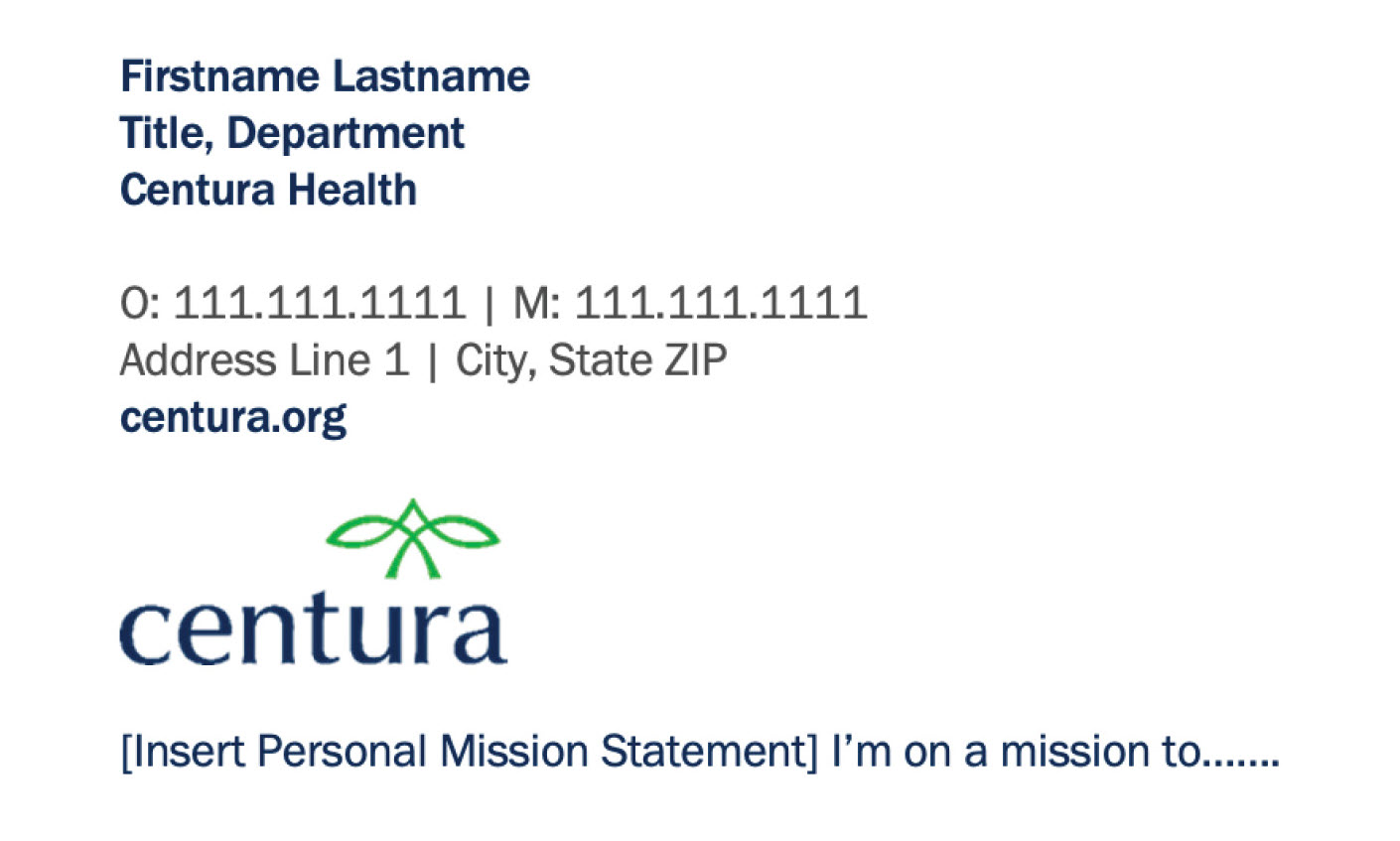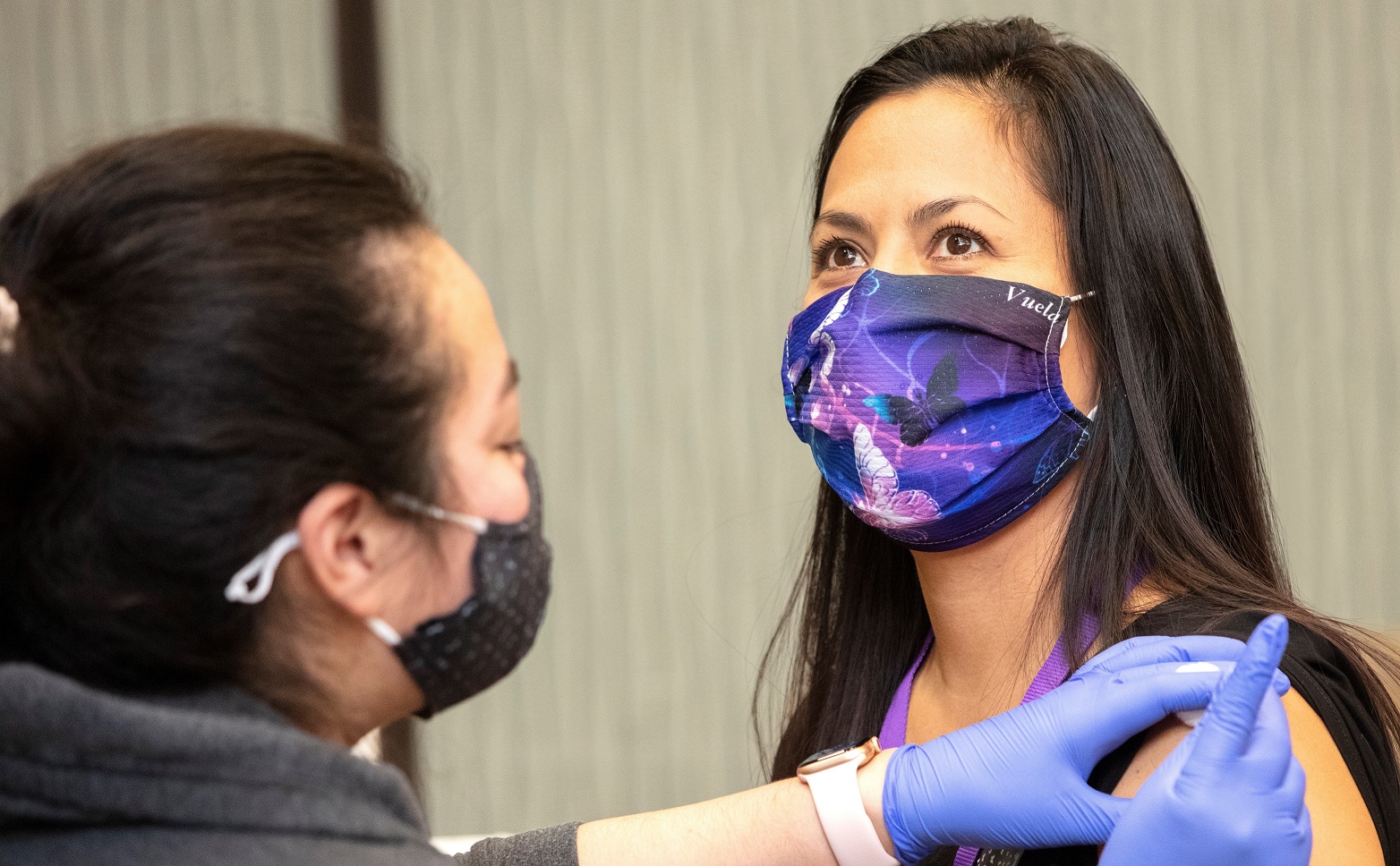| Mar. 9, 2021 Edition 84 |
 |
|

|
|||||||||||||||||||||||||||||||||||||||||||||||
|
|||||||||||||||||||||||||||||||||||||||||||||||

|
|||||||||||||||||||||||||||||||||||||||||||||||
| © 2021 Centura Health. All Rights Reserved. Proprietary and Confidential - for internal distribution only. |
In 2021, we’re celebrating 25 years of extending healing and wholeness. The introduction of our new visual identity and logo also marks an exciting chapter of coming together, stronger than ever before, as one connected ecosystem. To celebrate our new identity and highlight your incredible personal mission, new email signatures, like the example below, will start to rollout in your Outlook email today.
 |
As the COVID-19 vaccine becomes more widely available to groups across the US, it’s important to know the information related to vaccine cost and what you can expect when you receive your vaccine.
“Centura Health is proud to be able to offer the COVID-19 vaccination to our communities, and we are committed to sharing the most up-to-date and accurate information as more knowledge about the vaccine and its cost becomes available” said Mark Carley, President of Managed Care, Centura Health. “Many questions have arisen regarding the cost of the vaccine and how it is billed to insurance companies for recipients receiving the vaccine, and we want to provide our communities with information that will guide them in making the right choice about the vaccine for themselves and their families without worrying about cost.” 
Is the vaccine really free?
The vaccine is free of charge for every American who wants one — no matter which company made it, what type of health insurance you have, or even if you don’t have coverage at all.
You shouldn’t have to pay a vaccine administration fee or any other extra charge. The federal government has arranged to buy the vaccine and send it to health care providers and clinics, and those receiving it must agree to inoculate people without charging them.
If the vaccine is free to recipients, who is paying for it?
The US federal government is responsible for providing the vaccine to all Americans and has invested $10 billion in research, production, and distribution of COVID-19 vaccines. The vaccines are free to the public under the Coronavirus Aid, Relief and Economic Security (CARES) Act, signed into law in March 2020, as well as several other laws.
If you’re covered under Medicare or Medicaid, your vaccine will be paid for by State and Federal programs.
If you have commercial insurance and receive the vaccine from an in-network provider, you won’t have out-of-pocket costs.
If you have commercial insurance and receive the vaccine from an out-of-network provider, you won’t have to worry about balance billing or surprise billing when getting a COVID-19 vaccine. Wherever you get it, you won’t have out-of-pocket costs.
If you don’t have insurance, your vaccine is still covered. Health care providers who vaccinate you can be reimbursed through the Provider Relief Fund.
Is there any way I would receive a bill?
As more vaccines become available and more priority groups receive access to them, one possible way you could get a bill is if you get a COVID-19 vaccine as part of a doctor’s office visit that you attend for multiple reasons. For example, if you seek advice about your cholesterol or shoulder pain during the same visit in which you receive your vaccine, you may be responsible for your typical copay or coinsurance for the care you receive for those other health concerns — but you will not get a bill for the vaccine itself.
In the event you get a bill for the COVID-19 vaccine in error, contact your health insurer, or your health care provider if you’re uninsured, and explain the issue.
Caring for the mind, body and spirit of those in our communities is a top priority for Centura Health. 1,287 Coloradans lost their lives to suicide in 2019.1 This was not only an increase from the prior year — it was also the highest number of suicides recorded in Colorado, and we are dedicated to helping our patients, families and caregivers combat this alarming increase.
Centura has been awarded grant funding for the national Zero Suicide initiative to improve suicide risk assessment and suicide prevention education, with the goal of decreasing suicide deaths in Colorado by 99% by 2022.
We need your help! As part of the Zero Suicide initiative, please complete this online survey about suicide and suicide prevention before March 15 so we can gain a better understanding of Centura’s ability to address suicide-related issues and identify training and education opportunities that will enhance patient care and safety across our connected ecosystem. All responses are anonymous and the survey should take between five and 10 minutes to complete.
Suicide prevention is a shared responsibility among all our caregivers. Thank you in advance for your willingness to support Centura’s efforts to address this critical issue and for providing the highest quality whole person care for our patients and families.
Questions?
Please contact Centura’s Zero Suicide Coordinator, Christina Dolan at ChristinaDolan@Centura.Org.
The past year has been challenging during the pandemic, but it has invited connection and deepened relationships, as we have worked to support each other and provided hope to our communities. Learning about your unique experience and engagement is crucial, and we invite you to share your story with us in Centura Health’s Associate and Physician Engagement surveys beginning Wednesday, Mar. 17.
Designed to measure key drivers of workplace engagement, these surveys are an opportunity for you to share your unique experiences working at Centura. Your participation ensures we obtain valuable feedback from you, as we work to achieve Centura Health’s 2025 aspirations.
The confidential surveys run through March 31 and may only be taken online. Check your Centura Health email inbox the morning of March 17 for a message from our survey partner, Glint (survey@glintinc.com), that will provide a link to the survey and access instructions. The full associate survey takes approximately 15 minutes to complete, and the survey questions will cover important engagement topics about your unique experiences.
We are committed to building a culture where you can live your mission, grow in your purpose and encounter meaningful and exciting experiences. Your engagement is our priority! Thank you in advance for taking time to complete the survey and sharing your important feedback with us.
Questions?
Please contact your human resources leader or email engagement@centura.org.
QuickCharge, the software we use across our connected ecosystem to manage payments at retail locations within our care facilities, allows our people to conveniently pay for pharmacy, cafeteria, gift shop and coffee shop purchases with a quick badge swipe. For associates who have authorized payroll deductions, QuickCharge connects directly with our payroll system to deduct these purchases from our associates’ paychecks without having to carry cash or credit cards while at work.
Recent technical difficulties within the QuickCharge system have resulted in some delays in these charges being reported to our payroll system. Our IT team has been working hard to reconcile these deductions, spanning October 2020 – January 2021, and the delayed QuickCharge deductions will appear on associates’ paychecks over the next seven pay periods.
The financial health of our incredible people is important to us. Impacted associates will be notified in advance via email the week prior to the paycheck on which their deduction will appear. Please watch your inbox for these individual notifications over the coming weeks.
Most delayed QuickCharge deductions total less than $10 per associate, and nearly all are less than $50 per associate. Any associate whose deduction will total more than $50 will be contacted with specific information about the amount and date of their deduction.
Thank you for your support as we work to correct this issue and streamline the convenient, accurate payment options available to our people.
Questions?
Contact the People Resource Center at peopleresourcecenter@centura.org or 888-622-1111.
To ensure faster resolution of time-sensitive issues, Information Technology (IT) has created multiple options for reporting issues or requesting services. While it may be tempting to go through “alternative” channels (e.g., sending emails to your go-to person, asking your clinical informaticist, waiting to report issues at Safety Huddle, ignoring or failing to report issues, etc.), doing so may significantly delay the issue resolution time.
In fact, 74% of all calls to the Centura Service Center are resolved during the initial call. Only 26% of the calls are escalated to Tier 2 support. You can trust that 7 out of 10 calls will be resolved within minutes of reaching out to the Service Center.
We are here to help you! Current options for reporting issues, requesting IT assistance or support include:
On Sunday, March 14, Daylight Savings Time begins and the clocks will move forward one hour, resulting in a missed 2:00 a.m. (02:00) hour. For all Centura Health hospitals and clinics this will impact activities that are dependent upon a timing sequence (e.g. patient transfers, hourly medications, and flowsheet documentation). Please refer to the instructions below for specific direction regarding how to handle this missed hour within Epic. The “DST period” will be the gap between 1:59 a.m. (01:59) and 3:00 a.m. (03:00), representing the skipped or non-existent hour that should have occurred between those times.
|